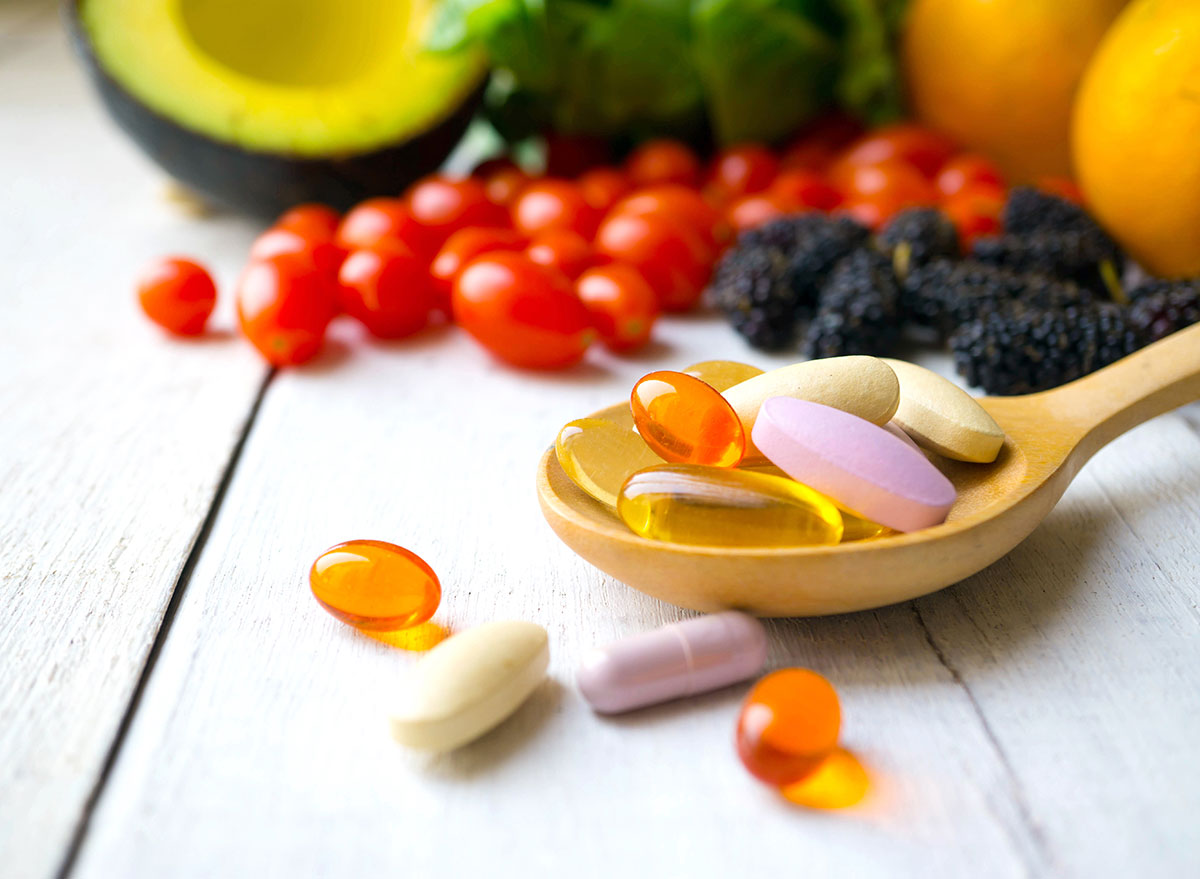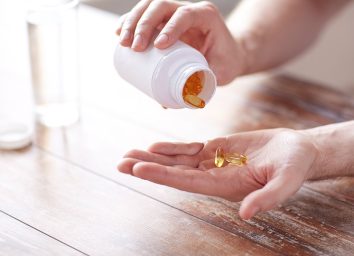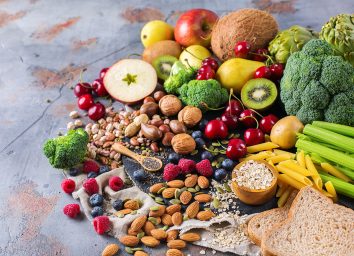Do You Need to Take a Multivitamin? Here's What Experts Say

There are many options when it comes to multivitamins, and we've been told to take supplements to make sure we're not missing out on vital nutrients, but do multivitamins work? Do you really need to take one every day?
The answer, according to health experts, is: well, it depends.
Lisa Richards, nutritionist and author of The Candida Diet, notes that while multivitamins have been popular ever since they emerged on the marketplace for folks who eat a balanced diet, they're far from a requirement.
"There is little science to back up claims that multivitamins improve health outcomes for individuals who already follow a fairly healthy dietary pattern," she says.
Dr. Yelena Deshko, ND, agrees with this idea, too.
"If you have a varied and healthful diet, take no medications, and do not suffer from any digestive issues, you may not need a daily multi," she explains
That said, the issue does get a bit murkier. Here's what our experts have to say about if multivitamins work and if you really need to take one.
Do you need to take a multivitamin?
Experts note that in some cases, taking a multivitamin can indeed be beneficial for some. They could be good for you…
If you are at risk for or have certain diseases.
Certain diseases—or even risk factors—might make you more susceptible to vitamin or mineral deficiencies and thus make a multivitamin a good idea for your daily routine. These include people with anemia and osteoporosis and those with malabsorption disorders including IBS or colitis.
If you take certain medications.
Some medications, like heart medications, can deplete important nutrients, explains cardiologist Dr. Stephen Sinatra. Those on these medications may benefit from taking a daily multi to make up for lost vitamins and minerals.
If your diet is insufficient in some nutrients.
If you're a picky eater, a multivitamin is likely a good idea—especially if the foods you like are low in nutrients, explains Calloway Cook, founder of Illuminate Labs.
"If you're eating processed food multiple times a day and low quantities of produce, it's more beneficial for you than someone eating a healthier diet, since you're likely deficient in more nutrients contained in the multivitamin," he explains.
But this holds true even for those on healthy diets that nevertheless exclude whole food groups, such as grains or animal products.
"The USDA recommends that you eat a balanced diet from the 5 food groups to get essential nutrients," says Dr. James G. Elliott, Ph.D., Director of nutrition and Supplement First co-founder. "Certain popular diets may cut out one or more foods groups altogether. Certain food allergies may also eliminate a food group. In these cases, a supplement can replace the vitamins from that missing food group."
If you're in a high-risk group.
Some people are genetically or otherwise predisposed to nutrient deficiencies, such as those who elderly, pregnant women, or menstruating women.
"Few people can benefit from a multivitamin as much as women during their periods," explains Samantha Morrison, a Health and Wellness expert for Glacier Wellness. "Keep in mind that women typically lose approximately 1/4 cup of blood per cycle, which means that menstruation is depleting their body of vital nutrients and minerals."
Wonderlabs CEO Mike Hester also notes that people who work out often would do well to take a multivitamin.
"Physically active individuals actually need more vitamins and minerals to help their bodies recover from the activity," he says. "As the process of burning energy can affect vitamin absorption."
If you have high stress.
Stress can affect your digestion and nutrient absorption, so if you're frequently stressed, a multivitamin may be a good idea.
"Currently, most Americans are quite stressed and need plenty of B vitamins to help support their adrenals and their brain," explains Pam Machemehl Helmly, CN, Founder and Chief Science Officer of Wellnicity. "We need to remember that most of the multivitamins carry cofactors necessary for proper neurotransmitter and hormone synthesis."
Do multivitamins work for everyone?
If you're not in one of these groups, however, Elliott notes that "eating a balanced diet and getting 30 minutes of natural sunlight every day should be enough." In some cases, taking an unnecessary multivitamin can even be a risky choice.
"There is such thing as nutrient toxicities," says NavNirat Nibber, ND and Medical Advisor at Advanced Orthomolecular Research. "To assess these, it's best to have someone review physical symptoms with your lab values."
This is mostly in the case of "poorly formulated" multivitamins, notes Cook. These, he says, can have unnecessarily high levels of minerals.
"Consumers eating a Standard American Diet (SAD) likely already have enough calcium and iron, so taking a multivitamin (which adds more) can be harmful after years of supplementation," she says.
Dr. Steven Gundry, medical director at The International Heart and Lung Institute Center for Restorative Medicine, also warns that consumers should be aware of wheat- or corn-based fillers in supplements, especially those with gluten sensitivities, and Deshko adds that many brands of multivitamins contain artificial colors, flavors, and other unhealthy ingredients like polyethylene glycol and hydrogenated oils.
Our experts also highlight another issue: the possibility that consumers would treat taking a multivitamin as an insurance policy.
"The biggest drawback of taking multivitamins is getting trapped in thinking that you're completely protected from deficiencies," says Morrisson. "Multivitamins are geared to provide most of your general vitamin needs, but they do not cover everything. For that reason, it's so important to get tested for deficiencies so that you can properly target your specific needs. In many cases, it's smarter to take individual supplements as opposed to 'playing it safe' with a multivitamin."
In general, however, "multivitamins are safe if they come from a trusted brand," notes Elliott, who nevertheless recommends always discussing any health concerns with your doctor before beginning a multivitamin protocol.
"Your doctor is the most qualified to make recommendations based on your personal health issues and vitamin deficiencies," he says. "Follow the dosage instructions so that you do not exceed the recommended daily allowance for certain vitamins. And take into consideration the amount of vitamins that you are already getting from food."
What's the best way to choose a multivitamin?
If you decide that taking a multivitamin is right for you, there are a few things to bear in mind to make sure you're getting what you need.
"It is important to get a vitamin that is tailored to your exact needs," says Arielle Levitan, M.D., co-founder of Vous Vitamin. "I strongly believe in a personalized approach to vitamins. Ideally one should take a vitamin quiz or survey about their individual needs to get a product that has the proper amounts based on actual medical science."
Here are our experts' recommendations for choosing the best multi for your specific needs:
Look for a quality seal.
Because vitamins and supplements are not regulated by the FDA in the same way that medications are, it's important to be vigilant about quality. Our experts recommend always seeking out a seal, like GMP or USP, to ensure manufacturing standards.
"Always make sure to choose professional brands that have undergone third-party laboratory testing," says Deshko. "The supplement label should clearly state that the product does not contain preservatives, artificial flavor or color, yeast, soy, gluten, or sugar, as these can trigger sensitivity reactions in many people."
Know which nutrients you don't need…
Nutrients can either be water-soluble or fat-soluble, and while water-soluble ones consumed in excess are easily excreted out by the body, fat-soluble nutrients, like vitamin A and beta carotene, can be toxic if taken in too high a dose.
Deshko notes that vitamin A is known to inflict liver damage if taken in excess and may even increase cancer risk in smokers.
"Importantly, however, these findings do not apply to foods that are known to contain high amounts carotenoids such as carrots, sweet potatoes, and other red and orange vegetables," she adds.
Niacin is another one to watch, according to Helmly.
"If the niacin level is too high or in a difficult format to digest, a flush can occur," she says. "Patient will report burning of the skin and perhaps itching. It typically passes quickly; however it can be uncomfortable."
One study published in the Journal of the American Heart Association suggested that taking too much calcium in supplement form could increase the risk of plaque buildup in the arteries and damage the heart, warns Sinatra, who also notes that copper can have a pro-oxidant effect, damaging tissues and cells.
Iron can also be problematic if taken in excess, notes Richards, who says it can lead to gastrointestinal distress.
…and which you do.
Be wary of one-size-fits-all multivitamins, as everyone has different needs, depending on sex, age, and a variety of other factors. Women need more antioxidant protection than men, according to Sinatra, while men need zinc, selenium, and vitamin E for prostate protection.
Be aware, too, that just because your multivitamin claims it contains some of a vitamin or mineral you need doesn't mean it has enough.
"Many times, multivitamins appear to have everything, but the dosages are so low that they are quite ineffective," says Helmly. "I have told my patients occasionally that the 1-3 mg of a certain B vitamin in the inferior multivitamin that they are showing me will hardly handle one stressful phone call!"
While it's best to check with your doctor to see which vitamins you do and don't need, Gundry does note that most Americans are deficient in vitamins D3 and C, and vegans and people on PPIs are usually deficient in vitamin B12, so that's a good place to start.
"Ideally, people would get regular medical testing informing them of blood nutrient levels," says Cook. "Then they could tailor a supplement plan with their doctor to address those specific issues, rather than blindly take a generic multivitamin and hope for the best."
Choose supplements with the right kind of vitamins.
Simply put: Not all iterations of a vitamin are as easy to absorb.
"Vitamins and minerals all have various chemical forms," explains Deshko, "some of which are more absorbable than others." She cites the example of vitamin B12, which is available in three different forms: cyanocobalamin is the cheapest to produce, but hydroxycobalamin and methylcobalamin are both easier to absorb. Some supplements are also better absorbed in tandem with others: Hester cites the example of vitamin D, which is better absorbed in tandem with vitamin K2, so finding a supplement that includes both is a good idea.
Look for a multi you take multiple times a day.
While one-a-day vitamins may be easy, Deshko notes that they might not be the best when it comes to absorption.
"Unfortunately, many people are not able to properly digest these tablets to extract all the nutrients due to decreased stomach acidity," she says. "This is especially common in the elderly and those taking antacid medications. Look for a multivitamin that offers 2-3 times per day dosing, and always take with food, when your digestive system is primed for maximal nutrient extraction."
Eat your vitamins.
For most people, research shows that a multivitamin will never be as good a source of nutrients as diet.
"Food not only provides the natural form of the vitamin, but also other compounds that are designed to work with the nutrient to make it more efficient," says Richards. "When you isolate vitamins, you are losing much of the nutrient synergy found in whole foods." So which are the best foods to get everything you would from a multivitamin, naturally?
- Wild-Caught Fatty Fish. Salmon and salmonids like trout are high in vital omega-3 fatty acids, which are necessary for brain health. "Besides for being a healthier source of protein than most meats, fish is rich in omega-3 fatty acids and vitamin D," explains Morrisson. "Cold-water fish is arguably the best source of vitamin D when you're not getting a healthy dose from the sun." The pink fish is also rich in astaxanthin, a powerful antioxidant.
- Leafy Greens. Kale, spinach, arugula, and broccoli are all are rich in vitamins like A, C, and K, as well as manganese and B6. Members of the cruciferous veggie family are also rich in sulforaphane, folic acid, and indole-3 carbinol.
- Blueberries. These little berries are ultra-rich in antioxidants, potassium, and vitamin C to support brain and immune health.
- Orange Vegetables. Sweet potatoes, carrots, and pumpkin are all rich in beta carotene, which converts to vitamin A, essential for skin, eye, immune, and organ health.
- Healthy Fats. Avocado and olive oil are both rich in heart-healthy monounsaturated fats and antioxidants known as polyphenols.








